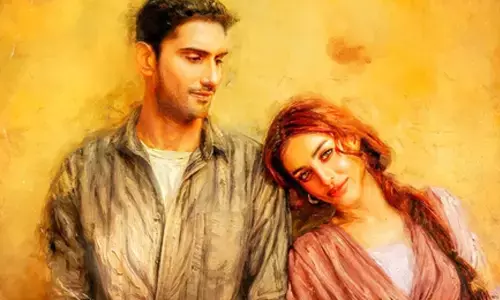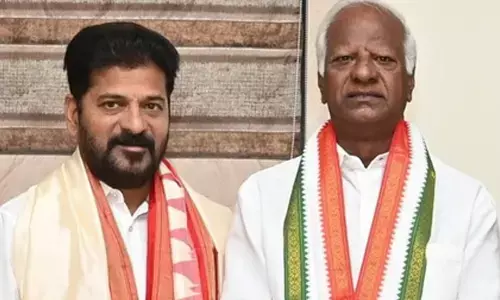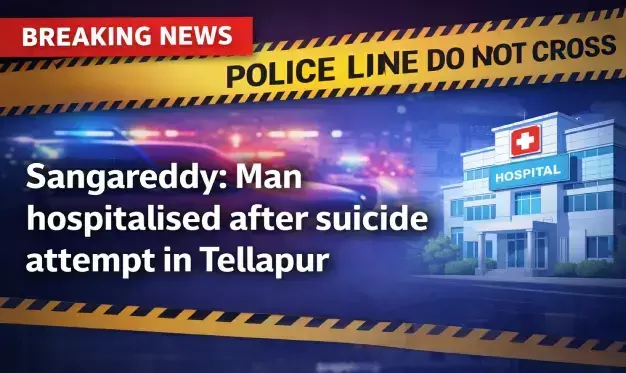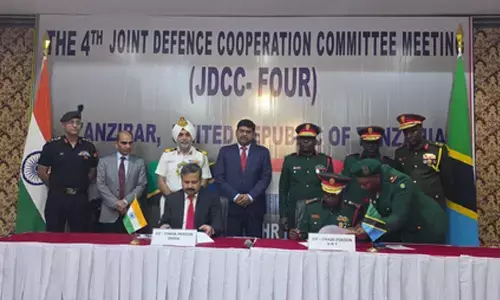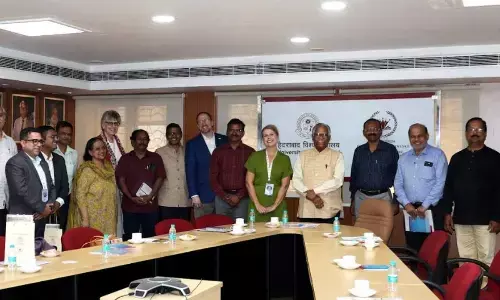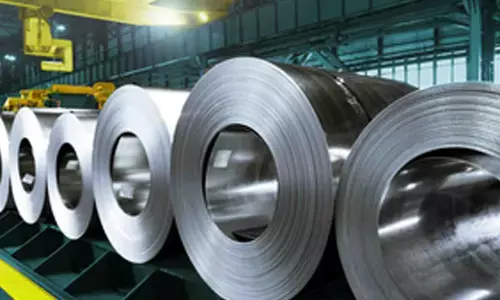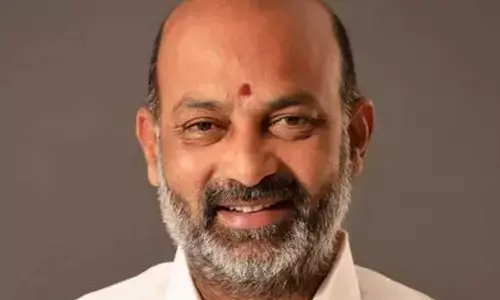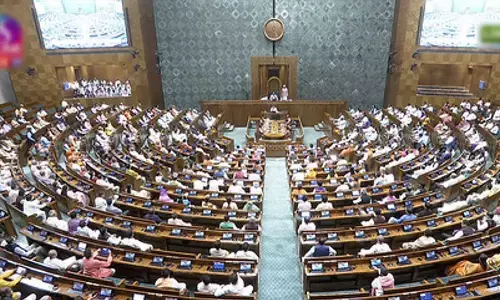Hurdles many for BJP, yet high on hopes
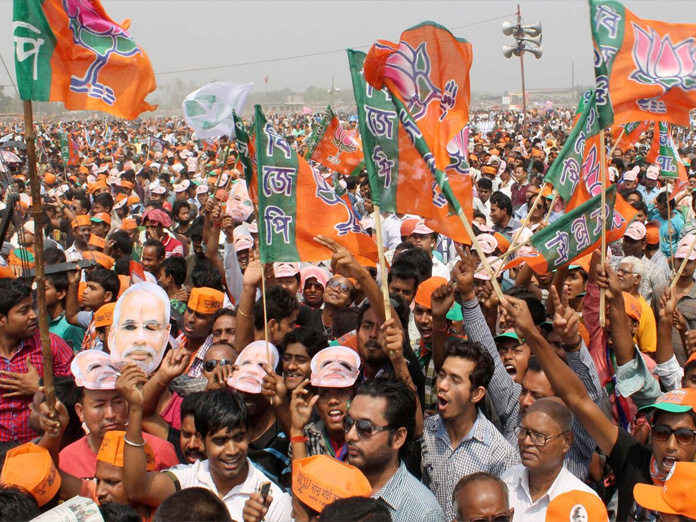
The nation seems to have gone into election mode All moves by the various parties whether they are ruling or in Opposition are focussed only on 2019 elections The statements of some leaders particularly those who feel are well saddled in their home turf are smacking of arrogance The advantage such parties have is that there is no voice of dissent
The nation seems to have gone into election mode. All moves by the various parties whether they are ruling or in Opposition are focussed only on 2019 elections. The statements of some leaders particularly those who feel are well saddled in their home turf are smacking of arrogance. The advantage such parties have is that there is no voice of dissent.
During Emergency, voice of the common man was muzzled but there used to be hush hush talk and Opposition grew among the voters which took the form of a Tsunami and threw the Congress out of power. But now the situation is different. Parties in power are trying to introduce control over various institutions including the media.
In some States, particularly in the southern part of the country, the attitude of the party in power is ‘take what we give, write what we say.’ What is more interesting is such words roll out during the speeches given by the top most leaders including Chief Ministers and party presidents. The saddest part is that those who should raise their voice seem to have sealed their lips whatever the reasons be.
Political parties may feel that everything is under control. But they should not forget that the voter is far more intelligent and knows when to strike hard. While in 2014, there was sort of an emotional wave in favour of Modi, this time the voter is thinking seriously as to who their leader should be. They are watching all machinations with hawk eye and there could be many surprises. It appears that the saffron party has sensed that all is not well, and Modi-Shah duo’s charisma is on the wane. Hence, it is now coming up with strategies to woo the voters.
Targeting the middle-income group, the budget 2019 is likely to announce increase in the income tax rebate. This was something which the Finance Minister Arun Jaitley during last four years said was not feasible. Similarly, it is also likely to announce several sops for the farmers. It hopes that the ten percent reservation to the economically weaker sections would rain in votes. Well, to what extent it will help the BJP to get back into driving seat remains to be seen. If the present trend and the people’s perception are any indication, the BJP has an uphill task.
One argument is that BJP has advantage as it would come up with several offers for the voters in its budget and that the Opposition unity is still not clear, and many parties would be fighting against the BJP and the many-cornered contest will help Modi stage a comeback.
But if one goes by what the Opposition says and is doing, there will be direct fight between two parties or coalitions. According to political analysts, there could be a direct fight between the BJP and the coalitions or parties that are strong in those regions in over 400 seats.
In other seats, there could be triangular contest particularly in States like West Bengal, Odisha and Delhi. Maharashtra presents a different scenario. It remains to be seen what stand the Shiv Sena would ultimately take. Sena has been attacking the BJP and if the coalition breaks, it could turn into a triangular contest which can be big loss for the BJP. But the general experience in the past has been that on the eve of elections, they bury their differences. If that happens, there will be direct contest between Sena-BJP and Congress-NCP in the State.
Coming down south, in Tamil Nadu, it is going to be a direct fight between the DMK-Congress alliance and the AIADMK-BJP. In Telangana, it will be a triangular fight as there would be no alliances. In Andhra Pradesh, the scenario is more complicated. The TDP has successfully created an anti-BJP wave and here the fight would be among the TDP, YSRCP, Jana Sena and the Congress.
In 2014, the poll scenario was one where people were tired of a decade of Congress-led government and wanted a change. An impression had gone around that there was an accidental Prime Minister. Allegations of corruption had touched a new high. Inflation was at its peak. But this time issues are different. The negative impact of demonetisation, the fall in farm incomes and growing rural debt seem to be taking centre stage.
Similarly, the issue of jobs and the rift between the Centre and the State on several issues and the growing feeling that the Centre had not followed the principle of cooperative federalism could pose a challenge for the ruling party.
Though caste plays a significant role in the elections, this time the slogans of the BJP may not hold the key. Even reservations and the emotive mandir issue may not help them as they expect. Rural distress in Maharashtra and problems faced by sugarcane farmers could adversely affect the fortunes of the ruling BJP. The BJP in the north has huge cadre which has well penetrated into the rural areas, but economic policies can strain such organisational gains.
In the last five years, Modi had firm hand on the wheel and had great mass appeal after Indira Gandhi. But history shows that such an appeal has its own limits if voters decide that enough is enough. The fact is that Modi while having his hand firm on the wheel did not take care to avoid over centralisation of power. The question the voters are asking themselves is are they better off now than 2014?
The BJP leaders refuse to accept the fact that that they have a rough road ahead even in States like Andhra Pradesh where the writing on the wall is very clear. They claim that the recent Assembly results in the Hindi States cannot be an indication of change of winds and that it was a semi-final.
If you take a peak at the elections held in 2018, one would find that the BJP faced a tough situation in Gujarat, the home turf of Modi and Amit Shah. Though it came back to power, it got 16 seats less than the previous election. It also lost in Punjab.
Out of 10 seats for which by-elections to Lok Sabha were held in 2018, seven were that of BJP but it could retain only two. It even lost the seat held by UP Chief Minister Yogi Adityanath. As far as the Congress is concerned, despite getting a boost by joining hands with 23 Opposition parties and despite gaining significant popularity, there is still a long way for it to go.
The Congress has proved that it is not entirely out of picture in 2019. But at the same time, the charm of Modi still cannot be said to have totally disappeared. The Congress needs to plan its strategies more carefully if Rahul Gandhi was to be considered as the Prime Ministerial candidate.
The biggest advantage the BJP has over INC is the apparent dominion of the Gandhi family over the latter. The BJP with all its possible drawbacks is still a party without a ‘family’ tag on it.








